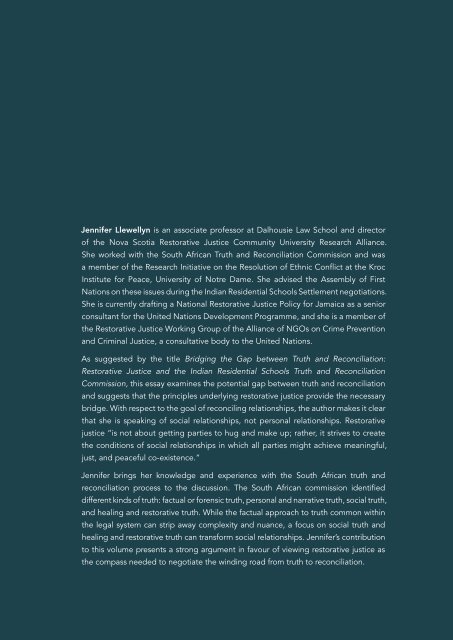Jennifer J. Llewellyn - Speaking My Truth
Jennifer J. Llewellyn - Speaking My Truth
Jennifer J. Llewellyn - Speaking My Truth
- No tags were found...
Create successful ePaper yourself
Turn your PDF publications into a flip-book with our unique Google optimized e-Paper software.
<strong>Jennifer</strong> <strong>Llewellyn</strong> is an associate professor at Dalhousie Law School and directorof the Nova Scotia Restorative Justice Community University Research Alliance.She worked with the South African <strong>Truth</strong> and Reconciliation Commission and wasa member of the Research Initiative on the Resolution of Ethnic Conflict at the KrocInstitute for Peace, University of Notre Dame. She advised the Assembly of FirstNations on these issues during the Indian Residential Schools Settlement negotiations.She is currently drafting a National Restorative Justice Policy for Jamaica as a seniorconsultant for the United Nations Development Programme, and she is a member ofthe Restorative Justice Working Group of the Alliance of NGOs on Crime Preventionand Criminal Justice, a consultative body to the United Nations.As suggested by the title Bridging the Gap between <strong>Truth</strong> and Reconciliation:Restorative Justice and the Indian Residential Schools <strong>Truth</strong> and ReconciliationCommission, this essay examines the potential gap between truth and reconciliationand suggests that the principles underlying restorative justice provide the necessarybridge. With respect to the goal of reconciling relationships, the author makes it clearthat she is speaking of social relationships, not personal relationships. Restorativejustice “is not about getting parties to hug and make up; rather, it strives to createthe conditions of social relationships in which all parties might achieve meaningful,just, and peaceful co-existence.”<strong>Jennifer</strong> brings her knowledge and experience with the South African truth andreconciliation process to the discussion. The South African commission identifieddifferent kinds of truth: factual or forensic truth, personal and narrative truth, social truth,and healing and restorative truth. While the factual approach to truth common withinthe legal system can strip away complexity and nuance, a focus on social truth andhealing and restorative truth can transform social relationships. <strong>Jennifer</strong>’s contributionto this volume presents a strong argument in favour of viewing restorative justice asthe compass needed to negotiate the winding road from truth to reconciliation.184 184 | |
















